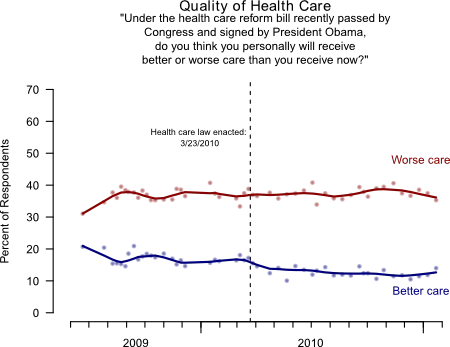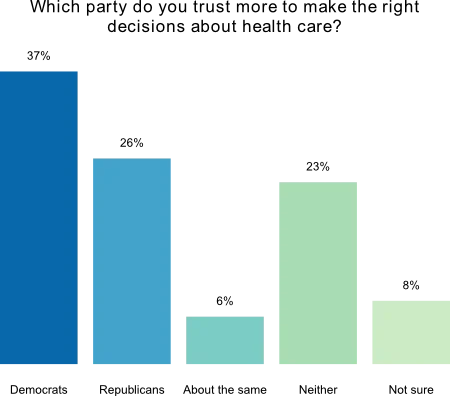Public opinion about the President's health care plan remains divided and very partisan, according to the latest Economist/YouGov Poll. 45% approve of the way Barack Obama is handling health care, while 49% disapprove.

77% of Democrats approve of the President's handling of this issue, but only 9% of Republicans do.
The country is equally polarized when it comes to what should happen now: 41% say they favor repeal of the health care law, while 38% oppose repeal. 73% of Republicans favor repeal, and 54% of Democrats don't.
Do you favor or oppose repealing President Obama's health care reform law passed last year by Congress
| Total | Democrats | Republicans | Independents | |
|---|---|---|---|---|
Favor | 41% | 25% | 73% | 39% |
Oppose | 38% | 54% | 15% | 45% |
Not sure | 21% | 21% | 11% | 17% |
But even Republicans favor some parts of the legislation. Two out of three Republicans want insurance companies to be required to cover pre-existing conditions, and about half of Republicans support no lifetime limits on benefits, requiring a minimum package of benefits and not allowing insurance companies to set higher rates for those in poor health. Republicans (and the country overall) are less supportive of other parts of the bill. In fact, Americans overall clearly oppose the individual mandate.
Next, we'd like to ask you about some specific parts of the current health care law. Please tell us whether you favor or oppose the following provisions.
| Total | Republicans | ||
|---|---|---|---|
Require all U.S. citizens and legal residents to have health insurance, or pay a tax penalty? | Favor | 27% | 7% |
Oppose | 54% | 84% | |
Not sure | 19% | 9% | |
Require employers to offer their employees health insurance, or pay a tax penalty? | Favor | 47% | 25% |
Oppose | 34% | 63% | |
Not sure | 18% | 12% | |
Require health plans to provide coverage for children up to age 26? | Favor | 52% | 27% |
Oppose | 30% | 58% | |
Not sure | 19% | 15% | |
Prevent insurers from charging more to cover people who are in poor health? | Favor | 65% | 48% |
Oppose | 20% | 37% | |
Not sure | 14% | 15% | |
Prevent insurers from imposing lifetime limits on benefits? | Favor | 67% | 49% |
Oppose | 14% | 30% | |
Not sure | 19% | 21% | |
Require all insurance policies to provide a minimum package of benefits? | Favor | 67% | 48% |
Oppose | 14% | 30% | |
Not sure | 19% | 22% | |
Provide a subsidy to help people with incomes of between $29,000 and $88,000 per year (for a family of 4) afford insurance? | Favor | 56% | 34% |
Oppose | 23% | 48% | |
Not sure | 20% | 18% | |
Guarantee access to insurance coverage for people with pre-existing conditions? | Favor | 80% | 66% |
Oppose | 9% | 20% | |
Not sure | 11% | 14% | |
There has been long-term fear about the impact of health care reform, and even now, when 56% of the country claims to understand the legislation, there is confusion about what it means. In this poll, more than a third of Americans claim their own health care will get worse because of the bill, a belief that has been fairly consistent throughout the debate over the legislation.

And more than half expect they will have to pay more for health care under the bill, another consistent finding since the start of debate on the subject.

As of now, more than three in ten Americans claim they have been personally affected by the health care legislation, even though most of the provisions have not yet gone into effect. And the people who claim to have been affected are more likely to be Republican (46%) than Democrat (23%), and more likely to already have health insurance (34%) than to be without it (22%).

The bill's perceived impact is overwhelmingly negative: 62% of those who say they have been affected claim the impact has been negative. Only 24% say it has been positive. And perceived impact is related to politics: 85% of Republicans and 91% of conservatives say the health care bill has had a negative impact on them; 52% of Democrats and 59% of liberals say they have seen a positive effect.
Have the changes that you experienced as a result of the health care legislation been positive or negative? (Asked if respondent has been personally affected by health care reform)
| Party ID | Ideology | ||||||
|---|---|---|---|---|---|---|---|
| |||||||
Positive | 24% | 52% | 2% | 30% | 59% | 37% | 4% |
Neither positive, nor negative | 14% | 20% | 13% | 8% | 18% | 20% | 5% |
Negative | 62% | 28% | 85% | 62% | 23% | 43% | 91% |
One of the political difficulties supporters of health care reform have always faced is that the majority of Americans who have health care insurance have been generally satisfied with it. Overall, 65% of Americans say they are satisfied with their health care coverage. That percentage rises to 79% among those who already have health insurance. Many Americans find it easy to worry that things can get worse.
In fact, by a margin of 44% to 18%, Americans say the bill will lose, not create, jobs. 54% expect employers will have to pay more for health insurance for their workers (although there is support for increased spending by employers to cover adult children of workers, removing the lifetime benefits cap, and making sure those in poor health pay the same premiums as those in good health). And most think employers will have to decrease take home pay to cover these changes.
But despite the divisions over this issue, Democrats retain an edge when it comes to the party Americans trust to handle health care. 37% say they trust the Democrats more on health care, while 26% trust the Republicans more. 23% trust neither party.







